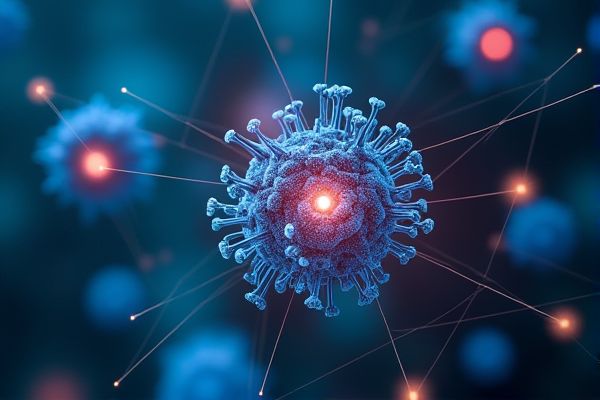
AI significantly enhances cancer research through its ability to analyze vast datasets quickly, identifying patterns that might go unnoticed by human researchers. Machine learning algorithms can predict patient responses to specific treatments, enabling personalized medicine approaches that improve outcomes. The integration of AI in imaging technologies allows for more accurate tumor detection and classification, streamlining diagnostic processes. By facilitating drug discovery and accelerating clinical trials, AI is transforming the landscape of cancer treatment and improving patient care.
AI usage in cancer research
Personalized treatment plans
AI can analyze vast datasets to identify patterns in cancer research, leading to better understanding of specific types of cancer. For example, the integration of AI in institutions like the National Cancer Institute has the potential to enhance the accuracy of diagnoses. Personalized treatment plans can be developed based on predictive analytics, allowing for tailored therapies that improve patient outcomes. This approach increases the chance of successful interventions and minimizes side effects by addressing the unique biological makeup of each patient.
Early detection and diagnosis
AI has the potential to significantly enhance early detection and diagnosis of cancer through advanced data analytics. Machine learning algorithms can analyze medical imaging, identifying patterns that may not be visible to the human eye, which could lead to earlier diagnosis. Institutions like Johns Hopkins are utilizing these technologies to improve predictive models for various cancer types. With the ability to process large datasets quickly, AI can aid researchers in identifying new biomarkers significant for early intervention.
Drug discovery and development
AI technologies have the potential to accelerate drug discovery in cancer research by analyzing vast datasets to identify potential drug candidates more efficiently. For example, institutions like the National Cancer Institute utilize machine learning algorithms to predict cancer treatment responses. The ability to simulate complex biological interactions may lead to more targeted therapies, offering a greater chance of success in clinical trials. By streamlining the development process, AI can reduce costs and time, increasing the likelihood of timely breakthroughs in cancer treatment.
Radiomics and imaging analysis
AI has the potential to enhance cancer research by improving the accuracy of radiomics and imaging analysis. Techniques like machine learning can identify patterns in imaging data that may not be visible to the human eye, leading to earlier detection of tumors. Institutions such as Johns Hopkins University are exploring these advancements to develop predictive models for patient outcomes. The integration of AI could streamline the analysis process, making it more efficient and potentially more cost-effective.
Genomic sequencing and interpretation
AI has the potential to significantly enhance cancer research by improving the accuracy of genomic sequencing and interpretation. For instance, algorithms can analyze vast amounts of genomic data to identify mutations linked to specific cancer types. This technology may streamline the process of developing personalized treatment plans tailored to individual patient profiles. Many institutions, such as the National Cancer Institute, are exploring the advantages of AI to accelerate discoveries in oncology.
Predictive modeling for treatment outcomes
AI has the potential to enhance cancer research by utilizing predictive modeling to forecast treatment outcomes. For instance, by analyzing large datasets from clinical trials, institutions like Johns Hopkins can identify patterns that may lead to more personalized treatment plans. Predictive algorithms can improve patient stratification, allowing for better-targeted therapies based on individual responses. This approach could ultimately increase the likelihood of favorable outcomes and improve survival rates for cancer patients.
Biomarker identification
AI has the potential to significantly enhance cancer research by streamlining biomarker identification processes. By analyzing vast datasets, machine learning algorithms can uncover patterns that human researchers may overlook, increasing the chance of discovering new biomarkers. For instance, institutions like the National Cancer Institute are actively exploring AI techniques to improve diagnostic accuracy. Success in this area could lead to more personalized treatment plans and better patient outcomes.
AI-driven clinical trials
AI applications in cancer research can enhance the efficiency of data analysis, potentially uncovering patterns that human researchers might miss. AI-driven clinical trials, such as those implemented by institutions like the Mayo Clinic, may offer more personalized treatment options based on patient data. These technologies can improve patient recruitment processes, increasing the chances of successful trial completions. By streamlining these processes, AI holds the possibility of accelerating drug development timelines.
Real-time data analysis and monitoring
AI usage in cancer research allows for the analysis of vast datasets, potentially leading to quicker identification of treatment options. Real-time data analysis enables researchers to monitor patient responses more effectively, improving the chances of personalized therapy success. Institutions like Johns Hopkins are leveraging AI to enhance predictive models for treatment outcomes. This technology could significantly reduce the time required for clinical decision-making, offering a tangible advantage in patient care.
Automated pathology and histology analysis
Automated pathology and histology analysis can significantly enhance the accuracy of cancer diagnostics. With AI algorithms, the identification of cellular patterns in tissue samples is expedited, thereby reducing the time required for diagnosis. For instance, implementing AI in institutions like Johns Hopkins can lead to more reliable tumor grading. This technology offers the potential for improved patient outcomes through earlier detection and tailored treatment plans.
 techknowy.com
techknowy.com